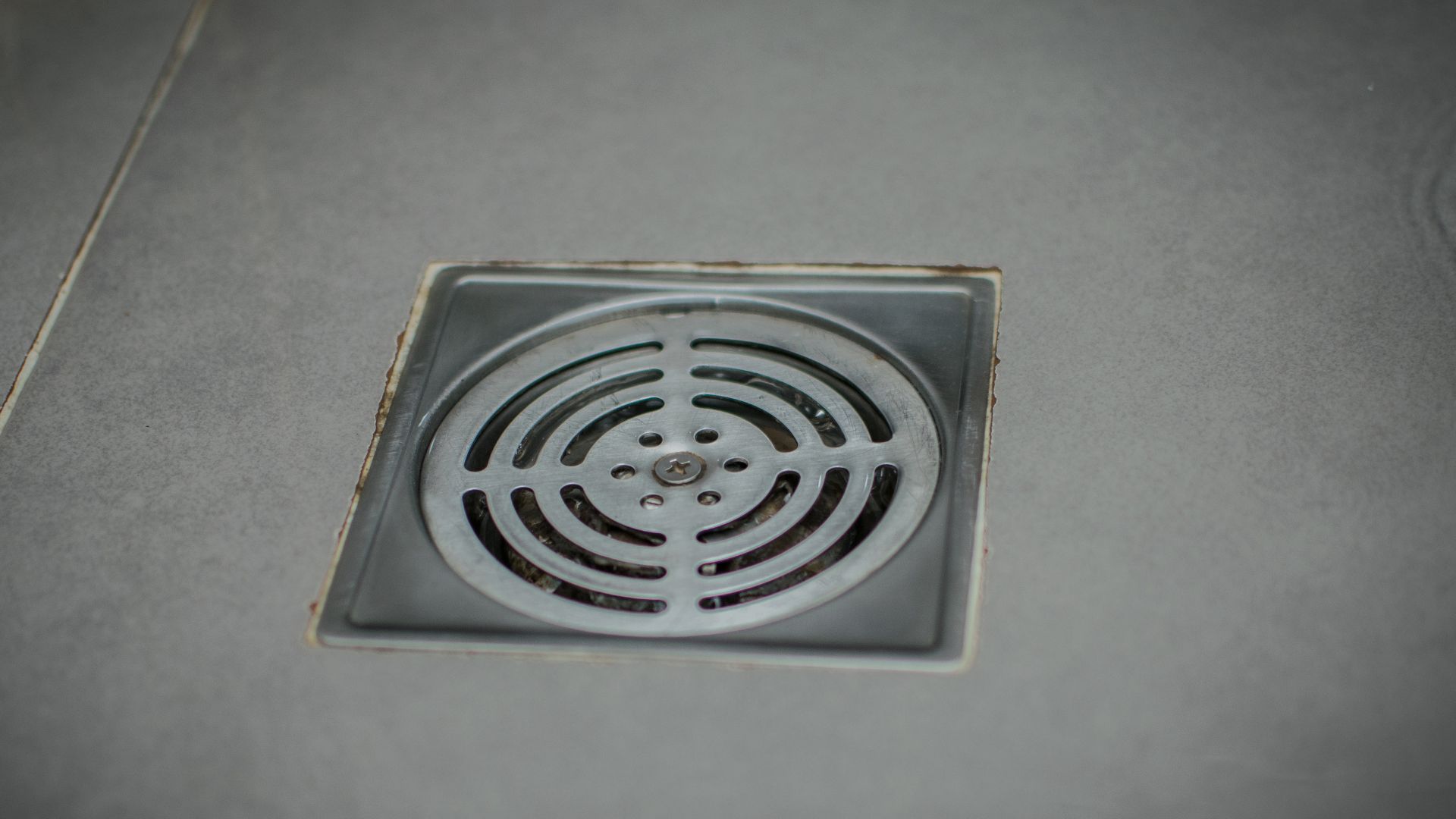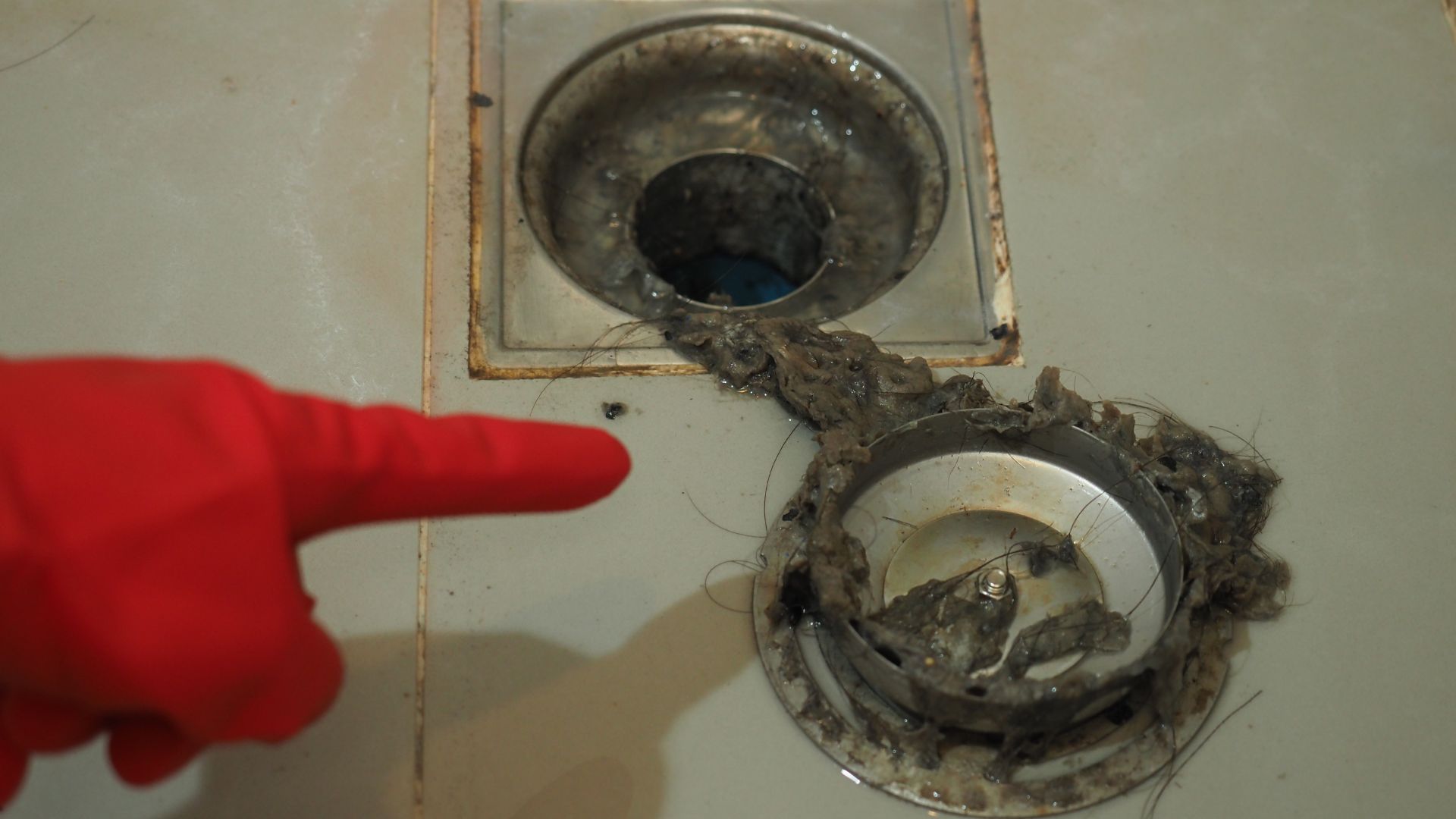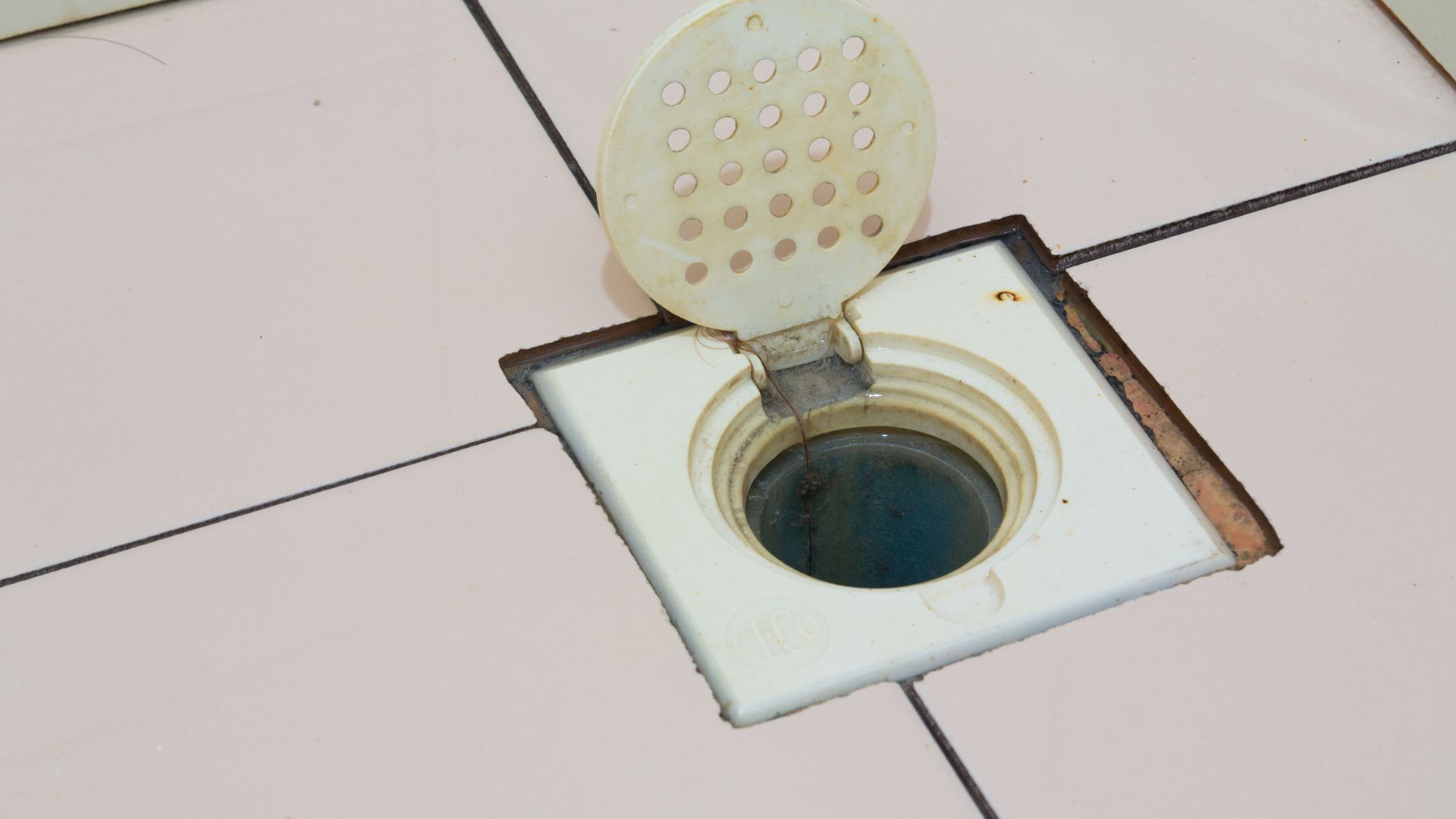7:00AM to 5:00PM
Floor drain odours can create an unpleasant living environment and pose health risks. Foul smells emanating from floor drains often indicate underlying plumbing issues that require attention. Sewer gases, bacteria build-up, and accumulated food particles contribute to these odours. Addressing floor drain odours promptly is crucial for maintaining a fresh and healthy home.
Floor drains are essential to a building’s plumbing system, designed to remove water and prevent flooding in various home areas. These drains typically feature a drain trap, a U-shaped pipe that holds water to seal against sewer gas and unpleasant smells. Floor drains are commonly found in bathrooms, laundry rooms, basements, and garages, where water will likely accumulate on the floor.
The drain trap in floor drains can develop an unpleasant smell if the water seal evaporates, allowing sewer gas to enter the room. Regular use of the drain helps maintain the water seal, but infrequently used drains may require periodic water addition to prevent floor trap smell.
Clogs caused by debris, food particles, and soap scum can also lead to odours and slow drainage. Pouring hot water or a mixture of baking soda and vinegar down the drain can help clear minor clogs and freshen the drain. A drain brush may be necessary for tougher clogs to remove the blockage and restore proper flow in the floor trap.

The P-trap is a crucial component of floor traps, designed to hold water and create a seal that prevents sewer gas and unpleasant smells from entering your living space. When the P-trap dries out due to infrequent use or evaporation, it can no longer effectively block odours, allowing foul smells to emanate from the drain.
To fix a dry P-trap, pour a few cups of water down the drain to restore the water seal. Schedule regular cleaning and maintenance for rarely used drains to ensure the P-trap remains filled. Add a cup of baking soda followed by vinegar to help deodorise the drain and maintain an odour-free environment.
Over time, organic matter, soap scum, and debris can accumulate in-floor traps, creating a breeding ground for bacteria. As these materials decompose, they release unpleasant odours, contributing to the foul smells coming from your drains.
To prevent build-up, incorporate regular cleaning of your floor waste into your maintenance routine. Use hot water, baking soda, and vinegar to naturally break down grime and deodorise the drain. For tougher build-up, use a drain snake or brush to scrub the inside of the pipe and remove stubborn debris.
Implementing a consistent cleaning routine and using appropriate solutions will help keep your bathroom drains free of bacteria and debris, minimising the risk of unpleasant smells.
Sewer gas is a mixture of methane and hydrogen sulphide gases that can pose health risks if inhaled in high concentrations. When floor traps or plumbing systems are damaged or improperly installed, sewer gas can leak into your living space, causing persistent foul odours.
To identify a sewer gas leak, look for signs such as bubbling or gurgling sounds from the drain, slow drainage, or sewer-like smells near the floor waste. If you suspect a sewer gas leak, contact a professional plumber immediately to assess the situation and make necessary repairs.
Ensuring proper ventilation in rooms with floor drains can also help reduce the risk of sewer gas accumulation. Regularly inspecting and maintaining your plumbing system prevents sewer gas leaks and keeps your home odour-free.
Clogs and slow-moving drains are common culprits behind floor drain odours. When debris like hair, soap scum, and food particles accumulate in the drain traps, they can create blockages that trap stagnant water and emit foul smells.
To unclog drains, start by using a plunger to dislodge minor blockages. A drain snake or auger can help remove the obstruction for tougher clogs. You can also try pouring hot water, baking soda, and vinegar down the drain to break down the clog and neutralise odours.
If DIY methods don’t resolve the issue, consider hiring a professional drain cleaning service. They have the tools and expertise to tackle stubborn clogs and ensure your floor traps function correctly.
Regular drain maintenance, such as using strainers to catch debris and avoiding flushing inappropriate items, can help prevent clogs and keep your drains flowing freely, minimising the risk of unpleasant odours in your living space.
Preventing floor drain odours is crucial for maintaining a fresh and healthy living environment. Implementing and incorporating simple strategies into your home maintenance routine can effectively combat foul smells and properly maintain your drains. In this section, we’ll explore four key areas to focus on when preventing floor drain odours.

Regular cleaning and maintenance are essential for keeping your floor drains free of foul odours. Establish a consistent cleaning routine to prevent the build-up of organic matter, bacteria, and other debris that can lead to unpleasant smells and potential health hazards.
To clean your floor drains, remove any visible debris from the drain cover. Then, slowly pour a pot of boiling water down the drain to help dissolve any grease or grime. Next, sprinkle a cup of baking soda into the drain, followed by a cup of white vinegar or lemon juice. Allow the mixture to fizz and sit for 15-30 minutes before flushing with hot water.
For eco-friendly cleaning, opt for natural products like baking soda, vinegar, and lemon juice, which effectively deodorise and break down organic materials without harsh chemicals.
Proper waste disposal is crucial in preventing drain clogs and odours. Avoid flushing items like hair, food particles, grease, and solid objects down your floor drains, as they can accumulate and create blockages that trap odours and lead to slow drainage.
To minimise the risk of clogs, install drain strainers or covers that catch hair, debris, and other solid materials before they enter the drain. Regularly clean these strainers to ensure they continue to function effectively.
Educate your household members about proper waste disposal practices and the importance of clear drains.
Proper ventilation and air circulation are vital in reducing floor drain odours. Ensure that rooms with floor drains, such as bathrooms and laundry areas, have adequate ventilation to help dissipate moisture and prevent the build-up of stagnant air, which can intensify bad smells.
Install exhaust fans or open windows to promote air circulation and remove humid air from the room. If your bathroom lacks a window, consider running the exhaust fan for 15-20 minutes after showers or baths to ensure proper ventilation and minimise the risk of odour build-up.
Regular professional plumbing inspections are essential for the preventive maintenance of your floor drains. A licensed plumber has the expertise and specialised equipment to inspect your drains thoroughly and identify potential issues before they escalate into major problems.
During an inspection, a plumbing professional can check for leaks, clogs, and damage to your drain pipes and sewer line. They can also assess the condition of your drain traps and ensure they are functioning correctly to prevent sewer gas from entering your living space.
Catching plumbing issues early through regular inspections can save you time, money, and frustration in the long run. It also helps maintain the proper functioning of your floor drains, minimising the risk of foul odours and creating a more pleasant living environment.
If you encounter persistent drain odours or suspect a plumbing issue, don’t hesitate to seek professional assistance. A skilled plumber can diagnose the problem and recommend the most appropriate solutions, ensuring your drains remain clean, odour-free, and functioning optimally.
While many floor drain odours can be addressed through regular cleaning and maintenance, there are times when professional assistance is necessary to resolve persistent issues effectively. In this section, we’ll discuss three situations where it’s advisable to seek the help of a licensed plumber.

It may be time to seek professional assistance if you’ve tried various DIY cleaning methods and preventive measures but still notice persistent odours emanating from your floor drains. A licensed plumber has the knowledge and tools to identify and resolve underlying issues contributing to foul smells.
Professional plumbers can thoroughly inspect your drainage system, locating hard-to-reach areas where organic matter and bacteria may accumulate. They can then employ specialised cleaning techniques and products to eliminate the source of the odour, ensuring a fresh and pleasant living environment.
Sewer gas leaks and plumbing damage should be addressed promptly to avoid potential health hazards and damage to your property. Contact a licensed plumber immediately if you suspect a sewer gas leak or notice signs of plumbing damage, such as cracks in drain pipes or water leaks.
Professional plumbers are equipped to identify the source of sewer gas leaks and repair damaged pipes or fixtures. They can also check for proper ventilation and ensure that your plumbing system functions optimally to prevent future leaks and maintain an odour-free environment.
If you experience frequently recurring clogs or slow-moving drains despite regular maintenance and cleaning efforts, it may indicate a more serious underlying plumbing problem. In such cases, it’s advisable to consult a professional plumber for a thorough drain inspection and cleaning.
A professional can use specialised tools, such as video cameras and drain snakes, to identify the cause of the recurring clogs, whether it’s a debris build-up, tree root intrusion, or a damaged sewer line. They can then recommend and implement the most appropriate solution, ensuring that your drains flow freely and preventing future clogs and odours.
This article has covered the common causes of floor drain odours and offered practical solutions to eliminate foul smells. We’ve discussed the importance of maintaining P-traps, preventing dry traps, and regularly cleaning and maintaining your drains. Addressing sewer gas leaks and dealing with clogs are essential for keeping your home fresh and odour-free.
Adopting a consistent cleaning routine, using eco-friendly products, and properly disposing of waste effectively prevent the accumulation of organic matter and bacteria that cause unpleasant odours. Adequate ventilation and seeking professional assistance are vital for maintaining a healthy living environment.
Prioritising the maintenance of your floor drains and promptly addressing any issues can help create a more pleasant and hygienic living space for you and your family. A fresh-smelling home not only improves your comfort but also promotes overall well-being. Please take action today by contacting us and enjoy the benefits of a clean, odour-free home!